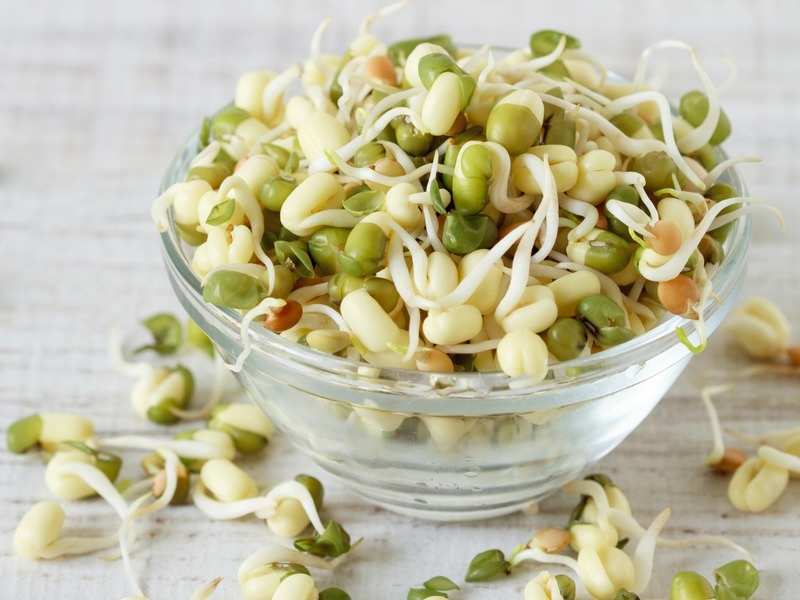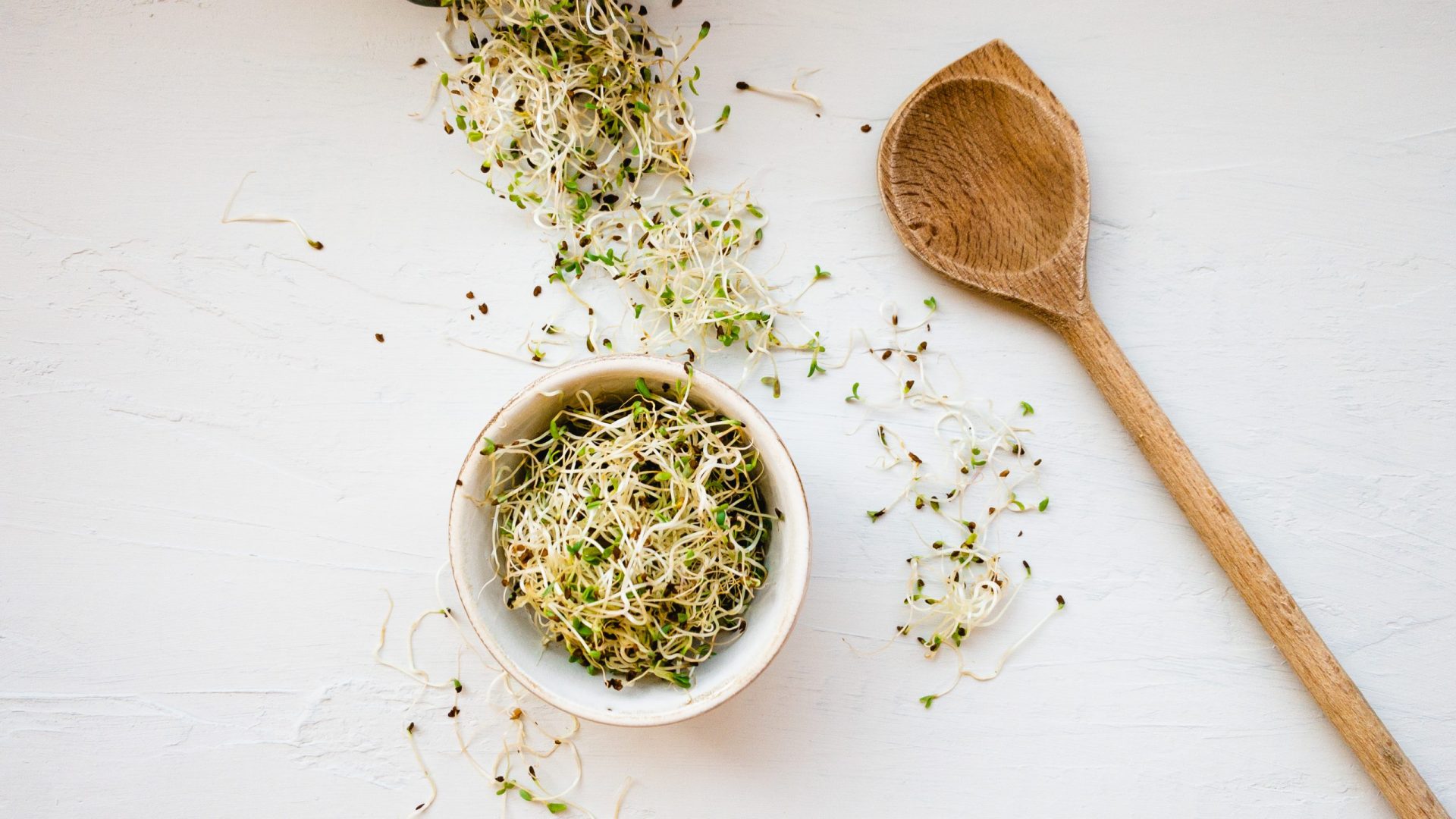The health benefits of sprouts make up a pretty impressive list and can include the ability to improve the digestive process, stimulate metabolism, increase enzyme activity throughout the body, prevent anemia, aid in weight loss, lower cholesterol, lower blood pressure, prevent neural tube defects in babies, improve skin health, improve vision, support the immune system, and increase usable energy reserves. Here are some Best Sprouts Benefits for Health
What Are Sprouts?
Sprouts can refer to a series of vegetable or vegetable beans after they begin to grow. The most common sprouts that people regularly use for cooking are alfalfa, soybeans, and mung beans, as well as several other types of bean sprouts. The reason many people turn to sprouts as a food source is that they contain a significant amount of vitamins and nutrients that are not present in the non-sprouting form. Typically, one week after germination, the sprouts will have the highest concentration and bioavailability of nutrients. Seeds contain a storehouse packed with all the important nutrients a plant will need to grow in its early days, so those little caps are packed with important organic compounds, vitamins, and minerals that our bodies can use as well.
There are several different cultures that highly value sprouts as an essential element of their food. Although they can be grown anywhere, they are often found as a topping for various dishes in Asian cuisine, as well as a common ingredient in salads. They are available no matter what market you go to.
The important thing to remember is that some of the nutritional value of the sprouts is lost when heated. Most of the time sprouts are added to food in their raw form both for flavor and to ensure they have the greatest nutritional impact. However, due to the risk of food poisoning, people considered high risk should cook sprouts thoroughly before consuming them according to the Academy of Nutrition and Dietetics. People at high risk include pregnant women, anyone with a weakened immune system, young children, or the elderly. Now, let’s explore what makes sprouts such a powerful, yet overlooked source of so many health benefits.
Nutrition Facts of Sprouts

All the nutritional and medicinal benefits of sprouts are derived from its impressive content of vitamins, minerals and organic compounds. They can contain a significant amount of protein and dietary fiber, as well as vitamin K, folate, pantothenic acid, niacin, thiamine, vitamin C, vitamin A, and riboflavin. In terms of minerals, they contain zinc, magnesium, iron, and calcium. Many of these component nutrients can increase dramatically as the outbreak continues to develop. Along with all these components, sprouts can also be a rich source of enzymes that are essential for good health.
Sprouts Benefits for Health
Now let’s explore some of the vital health benefits of sprouts bring us!
Promote Weight Loss
Sprouts are one of those foods that can be very high in nutrients but very low in calories. This means that you can eat them without worrying about compromising your diet. In a study conducted in Korea, rats, which were previously fed a high-fat diet, were given broccoli sprout extract and may have shown significant weight loss as well as fat loss. [9] Additionally, the fiber in sprouts can help you feel full, both by adding bulk to your intestines and by inhibiting the release of ghrelin, which is the hunger hormone that tells our minds that we are ready to eat something. This can cut down on snacking and overeating between meals, two of the biggest problems for someone with obesity.
Boost Metabolism
As already mentioned, sprouts contain a large number of enzymes. This large influx represents a good start for the body and can seriously affect its metabolic activity. Beyond that, sprouts can also contain a significant amount of protein, according to a report published in The Journal of Nutrition. Protein is necessary for almost all bodily processes, particularly for the creation and maintenance of cells, organ repair, skin regeneration, bone growth, and muscle development. This means sprouts are an easy and delicious way to improve your body’s overall functioning and development. This high nutritional content may also be the reason sprouts are so recommended for vegetarians and vegans as a major source of protein.
Also Read: Healthful Vegetarian Protein Sources
Improve Heart Health
Sprouts can be a great source of omega-3 fatty acids, especially alpha-linolenic acid (ALA), which is an essential fatty acid. Diets rich in omega-3 fatty acids can actually lower blood triglycerides and have been shown to improve HDL or healthy cholesterol, although the evidence for this is inconsistent. A study conducted by the Center for Genetics in Washington DC, USA, confirmed that sprouts are rich in antioxidants and omega-3s. Omega-3 fatty acids are also anti-inflammatory in nature, so they can also reduce stress on your cardiovascular system. The potassium content of sprouts can also help lower blood pressure, as potassium is a vasodilator and can release tension in the arteries and blood vessels. This increases circulation and oxygenation while reducing clotting and decreasing the risk of atherosclerosis, heart attacks, and strokes.
Helps In Eye Care
Vitamin A has been associated with improved vision health for many years. In addition, vitamin C acts as an antioxidant agent that can protect the cells of the eyes from free radicals. In this way, flare-ups can help prevent glaucoma, cataracts, and macular degeneration. In fact, it can also help improve vision, so eat your sprouts and start seeing the world a little more clearly!
Reduce Allergic Reactions
Some varieties of sprouts, such as broccoli sprouts, may have been linked to reduced allergic reactions, including asthma, which is an inflammatory condition of the respiratory system. Although the exact chemical pathway is not fully understood, additional research is being done on this topic all the time.
Improve Digestion
One of the best things about sprouts is that they can contain an unusually high amount of enzymes. This can help drive various metabolic processes and chemical reactions within the body, specifically when it comes to digestion. Enzymes are an important part of the digestive process and can help break down food effectively and can increase the absorption of nutrients from the digestive tract. Plus, the dietary fiber in sprouts could make them a major boost to digestive functions. Fiber increases the volume of stool, which facilitates its passage through the digestive tract. Dietary fiber can also stimulate gastric juices, which can help the enzymes already in sprouts break down food effectively and efficiently. They can be a great way to relieve constipation and diarrhea.
Also Read: How Many Calories in a Carrot?
Prevent Anemia
Anemia is the technical word for certain nutrient deficiencies. A common cause of anemia is iron deficiency. If you don’t eat enough foods with iron, your body can’t make enough hemoglobin, which is essential to allow your red blood cells to carry oxygen. This can lead to fatigue, poor concentration, nausea, lightheadedness, and stomach upsets. By maintaining your red blood cell count with adequate amounts of iron, you may be able to ensure better blood circulation in your body, thereby increasing the oxygenation of your organ systems to optimize your performance.
Prevent Neural Tube Defects
Neural tube defects are one of the most common side effects of a deficiency of folate, a B vitamin that is incredibly important especially for pregnant women. Sprouts seem to have a significant amount of folate, and thereby, may protect infants from this tragic condition.
Relieve Cold Sores
Cold sores can be an unsightly, painful, and uncomfortable condition to suffer through. If they get infected, they can even become a serious health risk. There is a specific amino acid, called lysine, which inhibits the growth of cold sores and treats them if they appear. This enzyme can be conveniently found in significant amounts in sprouts.




